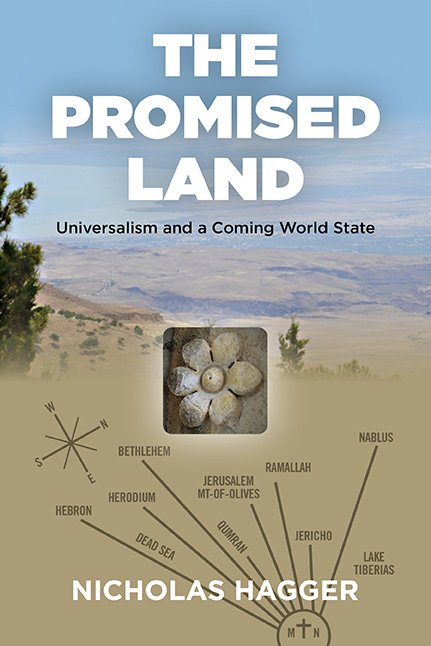Promised Land, The
Seeing the Promised Land of Moses as a symbol for the coming World State

Seeing the Promised Land of Moses as a symbol for the coming World State
Seeing the Promised Land of Moses as a symbol for the coming World State
Globalization, Political, Social
During a visit to Jordan Nicholas Hagger stood on Mount Nebo where the prophet Moses stood, and looked down on the Promised Land of Canaan that Moses saw shortly before he died. It seemed as if all the kingdoms of the earth were spread out below him, a new Promised Land: a coming World State called for by Dante and Kant, and more recently by Truman, Einstein, Churchill, Eisenhower, Gandhi, Russell, J.F. Kennedy and Gorbachev - and Hagger himself in World State and World Constitution.
Combining travelogue and historical reflection, Nicholas Hagger draws on previous visits to the Biblical Middle East and traces the development of his Universalism in his formative years and then in his “wilderness years”, when like Moses he spent 40 years in the wilderness setting out Universalism in 60 books and arriving at its ten commandments. He reflects on a remarkable life and its pattern and reaches some conclusions on the Providential nature of its direction and on the European civilisation. Weaving together his wanderings in Arabia and Egypt, his past travels and his writings, he presents a coming democratic, partly federal World State with sufficient authority to abolish war, enforce disarmament, combat famine, disease and poverty and solve the world’s financial, environmental and virological problems, and in a closing vision a coming Promised Land that like Moses he will not live to see. This is a stunning work with a prophetic vision of the future.
Click on the circles below to see more reviews
The Promised Land brings the dimensions of Nicholas’ universalism to bear on the coming world state – mystical, historical, literary, religious and political – which he sums up in a declaration of 12 propositions (pp. 80 ff.), which would have far-reaching reverberations for the renewal of culture. He also summarises 10 primary aspects of universalism and 10 corresponding principles and commandments. These include living in harmony with humankind, seeking a centre-shift within yourself to experience the unitive vision, the spreading of kindness and love, and working for world peace. The prophetic promised land of the title is embodied in Nicholas’ vision of the seven goals of the world state fulfilled, an inspiring and potentially achievable prospect envisaged by many great thinkers, and his metaphorical comparison of himself with Moses as he stood on Mount Nebo is nothing if not self-confident of his eventual vindication. Only time will tell. ~ David Lorimer , Paradigm Explorer Scientific and Medical Network
Praise for King Charles the Wise: Using the framework of his world constitution and argument for a democratic state in his books reviewed in the last issue, Nicholas Hagger has written a poetic masque starting from questions arising from Brexit and Britain's potential role in a more united world. As one might expect, the author shows a broad understanding of the world situation communicated through various characters. There is no doubt that we need people of vision if we are to make the transition to a democratic world state even within the next hundred years. The masque is an intriguing way to convey this message. ~ David Lorimer, Paradigm Explorer